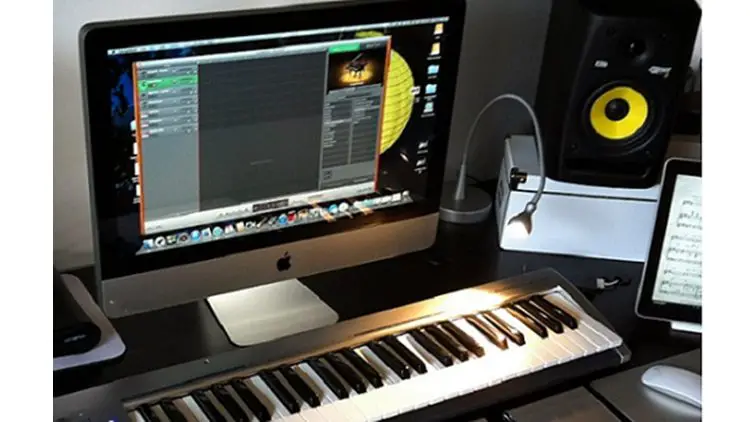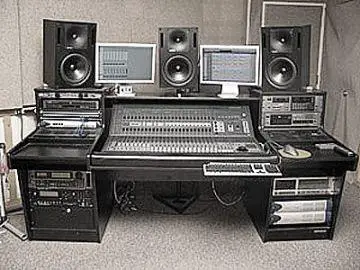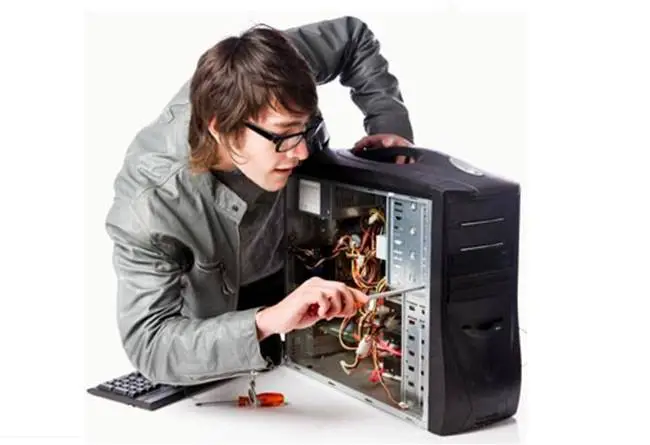
Buying or building a Laptop/computer for Music Production: Things to Look For
Computer: Heart of a Studio
The first thing that you need in any computer based studio is to have a computer, or a laptop. Without going into the debate of computer vs Mac, it is best to keep in mind that anything you build is made specifically for music.
So a good configuration would be a computer or a Mac with at least 4GB ram, and enough hard drive to store the music that you will create. You should have a CPU that is as powerful as you can afford.
You can use a laptop or a desktop but whatever you buy just make sure that is built to a very high spec, and if you can, keep it reserved only for music.
You don’t want a situation where you install some non-music related software, and it interferes with the various sound related settings of your computer.
Laptop / Computer for Music Production: Things to Look For
Can You Use A Laptop?
Yes, as long as the specs are good, but then it can turn out to be more expensive than a desktop. Besides, for the same price, a Laptop may also offer a smaller screen size. If you are into serious audio work, you will find that the screen size on most laptops is not large enough to give you a good view of all the tracks and windows.
You can go in for a laptop with a bigger screen size but then it definitely costs more.
Even the hard disk is generally slower to access on a laptop than on a desktop. This can be a major hindrance while doing serious audio work, but you can bypass this problem by going in for an external firewire hard drive, specifically meant for music purposes.
The plus point of a laptop is its portability, especially useful if you’ve a compact/mobile studio!
Get a Dedicated Computer Its best to have a dedicated computer for one purpose! That’s what the pros do!
Its best to have a dedicated computer for one purpose! That’s what the pros do!
Although, you may not face any problem running other things on the same machine, the thing is that as you get more serious about your work and as you load more and more samples and software on your machine, you do not want to install other things which could upset your existing applications.
Opt for a Faster Machine
This is applicable to whatever computer you use for your work, be it desktop or laptop.
To be able to get a really great performance from your computer for recording purposes, you will need to have a powerful machine with the fastest processor and tons of RAM.
This is because most of the audio applications are resource intensive and need powerful machines to work efficiently.
Of course, if you already have a computer then there is no need to go in for a new one; you can definitely upgrade your existing computer.
You could work on a slower machine but then you will not enjoy the experience as you will keep on getting messages related to low memory or the application may suddenly hang resulting in the loss of your unsaved work. This is the reason you need a computer with the best configuration.
Upgrading Your Machine
Since your computer is any ways going to be obsolete in a few years time, it is always better to upgrade or buy something which can be upgraded from time to time. This will help you save a few hundreds of dollars as you build your computer for music production.
To get the best results, upgrade your processor and add more RAM to your machine.
But before you go in for the fastest processor for your machine, it is better to check with the manufacturer if the new processor will be compatible with your existing machine.
A faster processor or an increased RAM will help till a particular point but after that it may not give you the desired results (considering the cost of up-gradation). This is because the performance is also dependent on other factors like bus speeds. So the best thing is to consult the manufacturer of your machine.
Optimize Your Computer
So why should you optimize your PC for music production? To get better performance of course!
If you are buying a new computer, chances are that the computer might be more optimized for office applications and probably for gaming, and not necessarily for music.
However, you can turn your computer from an average computer to a music making machine, by following some simple steps.
Here’s a Video on How To Build a Computer
Turn-off Wi-Fi
Make it habit to turn-off Wi-Fi before every gig, as it is observed that it can cause audio dropouts. Why? Because if the computer is trying to connect to an unstable network, it could cause CPU spikes which can result in audio dropouts.
So if you are a DJ or using your laptop for live music, you may want to turn it off.
BIOS & Other Updates
The first thing you should do is update the BIOS of your computer. BIOS stands for Basic Input Output System, which is sort of a mini operating system that runs on a chips on the mainboard. BIOS updates will improve the performance of the motherboard by fixing any bugs.
You can update the BIOS by visiting your computer manufacturers’ website and downloading the latest BIOS updates for your exact model.
Usually, you can also download other updates from these support pages, such as chipset drivers, which handles operations such as hard-drive and USB operations.
You also need to ensure that all the drivers for your audio interface and controllers are also updated.
Keep the Drivers Updated
Another thing to keep in mind when using PC for music production is to always use ASIO (Audio Stream Input Output) drivers, and not Direct sound or any other drivers.
Make sure whatever soundcard you select, it shows ASIO next to it. If you can’t see any such option, you can download these ASIO drivers from asioforall.com.
However, remember that most of the soundcard manufacturers also provide their own set of ASIO drivers, which are generally of a better quality than the generic ASIO drivers.
Performance Monitoring Applications
Over a period of time, as you install and remove applications from your computer, your computer may not perform at its peak.
In case, you feel that your computer has slowed down, you may install applications that can monitor the performance such as CPU usage, applications / processes that are causing CPU spikes and so on.
Some useful applications include the DPC Latency Checker.
Also, it is always a good idea to disable and uninstall unnecessary programs for optimal PC performance.
Do You Really Need a Customized Computer for Creating Music
 If you’re a newbie to computer music production, you can definitely use the computer that you have (which everybody in your house uses), to get an idea of what music production is all about.
If you’re a newbie to computer music production, you can definitely use the computer that you have (which everybody in your house uses), to get an idea of what music production is all about.
You can even pick up a new one with decent configurations.
However, most music producers choose to custom built a computer for serious music work. After years of creating music, they are more aware of they want from their computer and chose to build one accordingly (better graphics, or better sound, or more management software, etc.).
Depending on whether you’re going to use it for regular homework, or gaming, or video editing, or music creation, the configuration required is going to be different.
Buying Links: Computers/Laptops for Music Recording
Most dealers, nowadays, allow customers to either select from a variety of pre-built system categories (i.e. music technology, gaming, multimedia, home/office) or customize every aspect of the computer using a template designed for your chosen category (in our case, music technology). Some even allow you to have a Mac OS on your customized computer system.
This allows flexibility to both professionals and first timers, and is best for those who are not the typical DIY type (who prefer to build their own computers).
You can customize everything — processor, case, audio interface, or anything else. You can choose the software that you prefer, and all the necessary professional hardware required as part of your studio set-up.
Opting for a customized computer system has no bearing on the overall cost though (you pay for what you choose), but is highly recommended for those seriously into electronic music production.
- Computers optimized for Creating Music on zZounds
- [easyazon_link keywords=”Computers & Accessories” locale=”US” tag=”keytarhq04-20″]Computers & Accessories on Amazon[/easyazon_link]
External Hard Drives for Music
Though your computer speed is dependent on the processor and RAM, you still need a huge hard disk to save your music.
As you create more and more songs, you’ll feel the need for more storage space.
One option is to use an External Hard Drive.
So, even if your computer has a low amount of hard drive space, you can pick up a pretty large amount of extra space by getting an external hard drive (doesn’t cost a lot of money).
So you really don’t have to upgrade your computer or shell out more money for a new computer.
It’s best to keep your external HHD organised when storing files. So it’s better to create individual folders for each category: Music, tv shows, movies, etc.
To Conclude
A computer is the heart of any recording studio, be it a laptop or a desktop computer. You can use either but whatever you buy just make sure that is built to a very high spec, and if you can, keep it reserved only for music. The Laptop used for Music Production should have a very powerful CPU. When buying a laptop, you need to consider the strength and power of the computer processor, the amount of RAM, the stability and the available tools for the system.
Most professionals in the industry use a Macintosh computer to record music, but even a powerful PC should do just about fine.
Back to home page from Laptops for Music Production
KeytarHQ editorial team includes musicians who write and review products for pianists, keyboardists, guitarists & other musicians. KeytarHQ is the best online resource for information on keyboards, pianos, synths, keytars, guitars and music gear for musicians of all abilities, ages and interests.



For music production, you should go for a desktop. But if you want to do live music as well, then get a laptop. No matter how much power you get in to a laptop, a desktop is going to give you a much better workflow and PCs are better than MAC (in terms of value)
Personally i would go in for a desktop. They’re more reliable and can be upgraded/maintained easier. Plus they have a lot more ports and are priced slightly cheaper. If your going to be mobile then yeah a laptop is a obvious choice. If its for your Home studio then get a desktop. I have a Dell XPS 8700: intel i7, 12GB RAM, windows 7 64-bit. Its a solid computer, i do everything on it: music production, Graphic design and even some gaming.